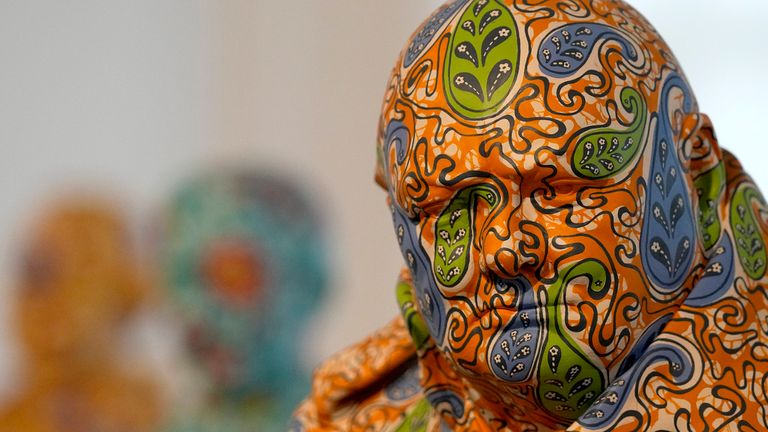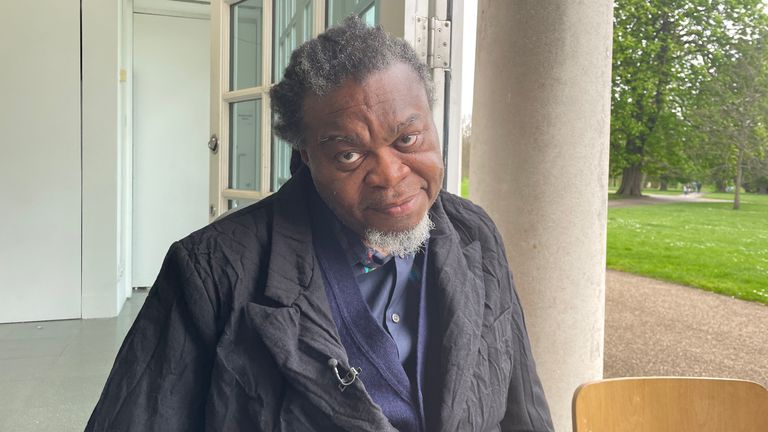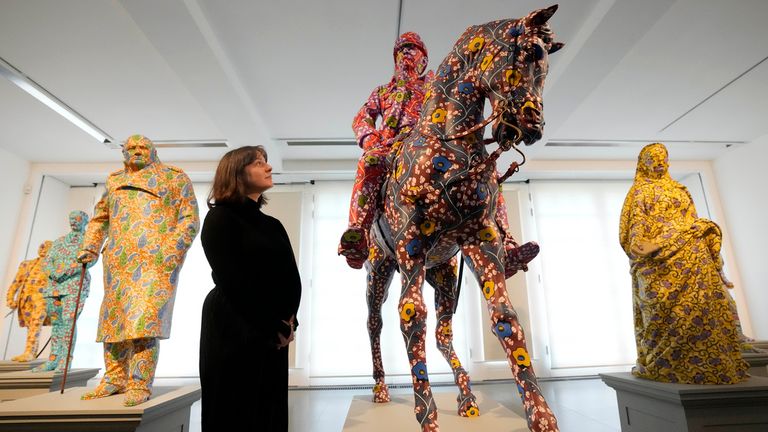Statues of Queen Victoria, Winston Churchill and Sir Charles Napier are dressed to impress in Dutch wax fabrics but stripped of bronze, marble and power.
An intention from Turner Prize-nominated artist Yinka Shonibare, who says we should question colonial history – not tear it down.
He told Sky News: “I personally don’t think you should take down statues. I think, in the same way that you wouldn’t go into a library and start burning all the books you’ve made. I don’t like.
“I don’t think you can erase history.”
Shonibare’s nuanced vision comes at a time when there is fierce debate about the role statues play, from colonialist Cecil Rhodes at an Oxford college to the 17th-century slave trader. Edward Colston – whose statue was torn down in 2020 and washed into Bristol harbor during a Black Lives Matter protest.
Sculptures made in fiberglass and hand-painted by Yinka Shonibare. Photo: AP
“I think the best thing to do is create platforms where people can really debate and talk. We also know that a 19th century person has different values.
“They’re not the same person now. And so I think we can’t necessarily confuse the 19th century with us. So I think we need some perspective. I think that, but we shouldn’t, erase history.”
In his new exhibition Suspended States, at the Serpentine Gallery in London, the artist analyzes the impact of imperial ambition.

Winston Churchill by Yinka Shonibare. Photo: AP
More than 5,000 books make up a piece called The War Library, all covered in Shonibare’s exclusive Dutch wax fabrics.
On the spines, he wrote the names of global conflicts and peace treaties from the 7th century to the present day.
One of them is titled Operation Grapes of Wrath, a 1996 Israeli operation against Hezbollah.
Another is titled Gaza War, but Shonibare says he is not taking sides or speaking specifically about contemporary issues.

The artist analyzes the impact of imperial ambition in new exhibition
Instead, he is trying to show that history repeats itself.
“The idea is to remind people that we have been here before and that we continue to have these peace treaties. Why do we as human beings continue to do this?
“It’s a question we need to ask ourselves.”
Read more on Sky News:
Harry and Meghan launch two new Netflix shows
Taylor Swift song ‘back on TikTok’
He said the aim of the artwork was to archive and remind people that “maybe you should start doing something about it to put an end to this”.
Part of the exhibition recreates buildings that have historically been safe places for the vulnerable, including Notre Dame, the Chiswick Women’s Refuge and the United Nations headquarters – all in miniature, with the only color being the illuminated Dutch textiles inside.

Keep up with the latest news from the UK and around the world by following Sky News
For the Nigerian-born artist’s rhetoric surrounding refugees, such as British Prime Minister Rishi Sunak making migrant crossings one of its five priorities is at odds.
“Phrases like ‘stop the boats’ are not something I like because we could experience a natural disaster here. We could be seeking refuge somewhere else. So we have to be compassionate.
“We live in a very rich country and I think housing should be at the top of our list.
“And I think that’s how you start to solve some of the fundamental social problems that we have… with housing, then, you can get a job. You can really contribute to the economy.”

Photo: AP
Conflict, refugees and our colonial history, the themes of Shonibare’s exhibition are hard-hitting and timely, but all beautifully dressed.
Suspended States will be on at Serpentine South from April 12th to September 1st.
This story originally appeared on News.sky.com read the full story







































